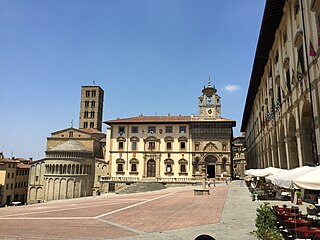
Arezzo is a city and comune in Italy and the capital of the province of the same name located in Tuscany. Arezzo is about 80 kilometres southeast of Florence at an elevation of 296 metres (971 ft) above sea level. It is also 30 km west of Città di Castello. In 2013 the population was about 99,000.

The San Giovenale Triptych or Cascia Altarpiece is a 1422 painting by Italian Renaissance artist Masaccio, housed in a museum behind the church of Cascia di Reggello, in the Roman Pieve of San Pietro di Cascia near Florence, Italy.

Poggibonsi is a town in the province of Siena, Tuscany, central Italy. It is located on the Elsa River and is the main centre of the Valdelsa Valley.

Buggiano is a comune (municipality) in the Province of Pistoia in the Italian region Tuscany, located about 45 kilometres (28 mi) northwest of Florence and about 15 kilometres (9 mi) southwest of Pistoia.

Calenzano is a comune (municipality) in the Metropolitan City of Florence in the Italian region Tuscany, located about 11 kilometres (7 mi) northwest of Florence. As of 31 December 2004, it had a population of 15,557 and an area of 76.9 square kilometres (29.7 sq mi).

Castelfiorentino is a town and comune (municipality) in the Metropolitan City of Florence, Tuscany, central Italy, halfway between Florence, Pisa (50 km) and Siena (55 km). The population is approximately 20,000 inhabitants. It is part of Valdelsa. Castelfiorentino borders the following municipalities: Certaldo, Empoli, Gambassi Terme, Montaione, Montespertoli and San Miniato.

Montespertoli is a comune (municipality) in the Metropolitan City of Florence in the Italian region Tuscany, located about 20 kilometres (12 mi) southwest of Florence.
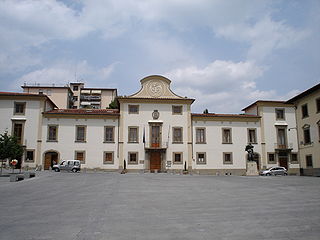
Pontassieve is a comune (municipality) in the Metropolitan City of Florence in the Italian region Tuscany, located about 14 kilometres (9 mi) east of Florence, nearby Fiesole, at the confluence of the Arno and Sieve rivers.

San Casciano in Val di Pesa is a comune (municipality) in the Metropolitan City of Florence in the Italian region Tuscany, located about 15 kilometres (9 mi) southwest of Florence.

Scandicci is a comune (municipality) of c. 50,000 inhabitants in the Metropolitan City of Florence in the Italian region Tuscany, located about 6 kilometres southwest of Florence.

Signa is a comune (municipality) in the Metropolitan City of Florence in the Italian region Tuscany, located about 12 kilometres (7 mi) west of Florence.

Tavarnelle Val di Pesa is a comune (municipality) in the Metropolitan City of Florence in the Italian region Tuscany, located about 25 kilometres south of Florence.

Cascina is a comune (municipality) in the Province of Pisa in the Italian region Tuscany, located about 60 kilometres (37 mi) west of Florence and about 13 kilometres (8 mi) southeast of Pisa.

Castellina in Chianti is a comune (municipality) of c. 2,800 inhabitants in the province of Siena, in the Italian region Tuscany, located about 35 kilometres (22 mi) south of Florence and about 15 kilometres (9 mi) northwest of Siena. It is part of the Chianti Hills, between the valleys of the Arbia, Pesa and Elsa rivers.
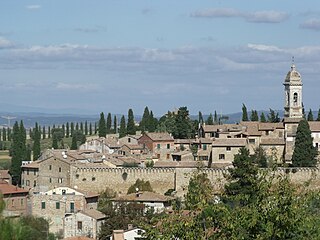
San Quirico d'Orcia is a comune (municipality) of about 2,500 inhabitants in the Province of Siena in the Italian region Tuscany, located about 80 kilometres (50 mi) southeast of Florence and about 35 kilometres (22 mi) southeast of Siena inside the Valdorcia landscape. It is named in honor of Saint Quiricus.
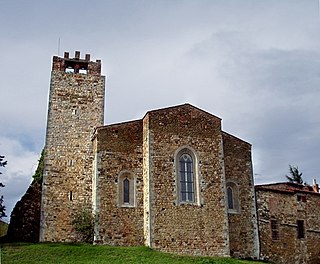
Campagnatico is a comune (municipality) in the Province of Grosseto in the Italian region Tuscany, located about 100 kilometres (62 mi) south of Florence and about 20 kilometres (12 mi) northeast of Grosseto in the valley of the Ombrone River.

Montelaterone is a village in Tuscany, central Italy, administratively a frazione of the comune of Arcidosso, province of Grosseto, in the area of Mount Amiata. At the time of the 2001 census its population amounted to 283.
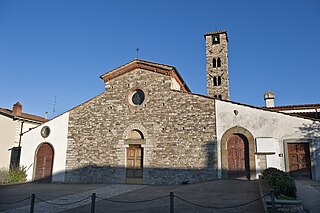
San Donnino is a Romanesque-style, Roman Catholic pieve church located in the frazione of Villamagna, in the territory of the commune of Bagno a Ripoli in the metropolitan city of Florence, region of Tuscany, Italy. The church was founded in the 8th century and rebuilt prior to the 14th century.
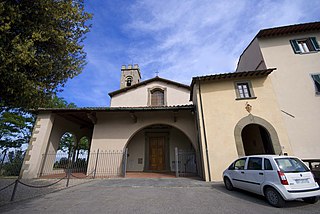
San Martino a Gangalandi is a Roman Catholic parish (pieve) church in the Gangalandi neighborhood of Lastra a Signa in the region of Tuscany, Italy. It is located via Leon Battista Alberti. Adjacent to the church is a small Museo Vicariale displaying some works of art.




























